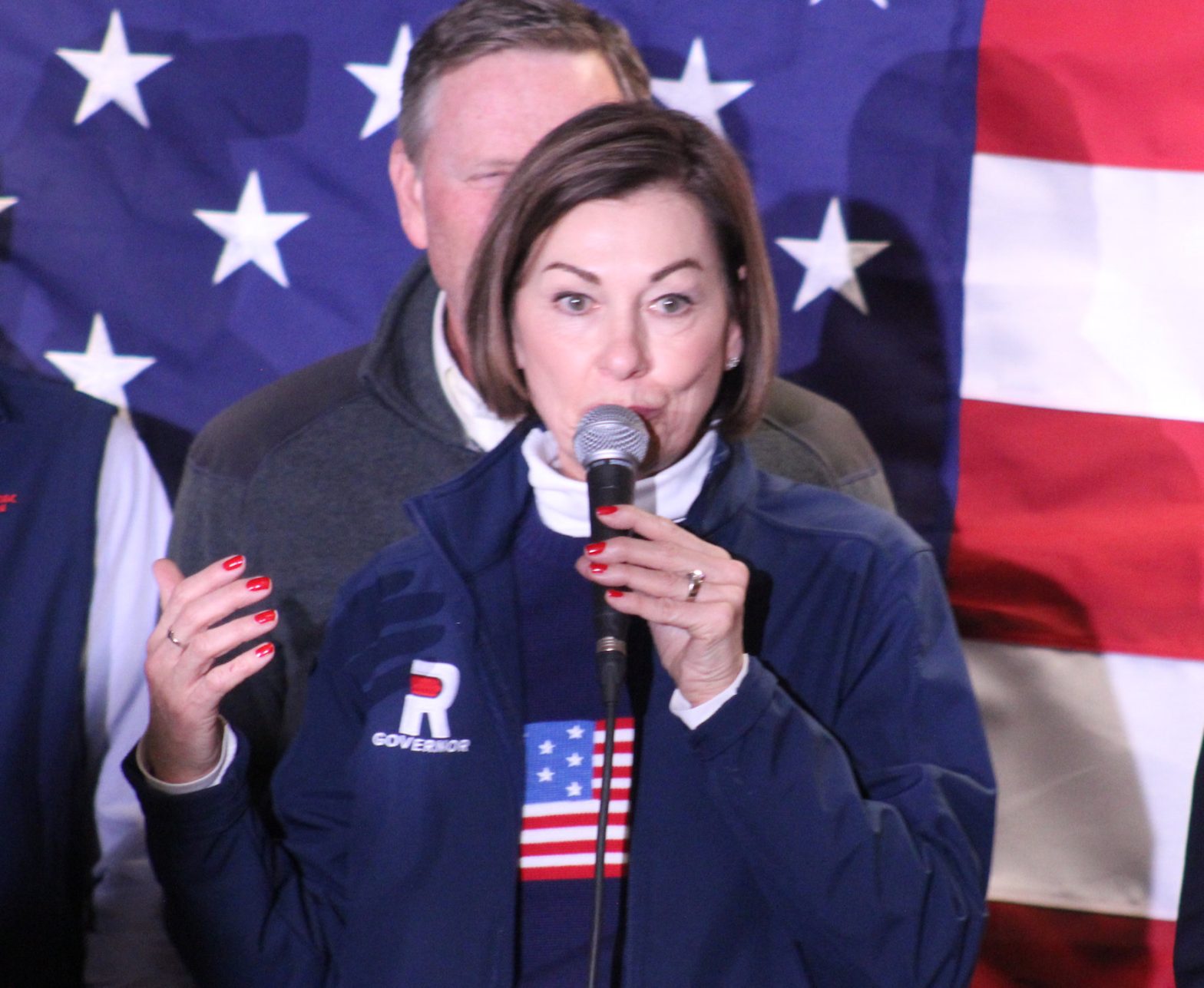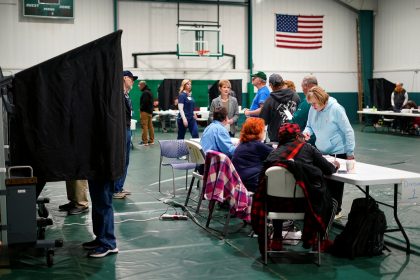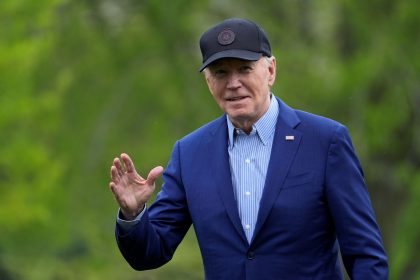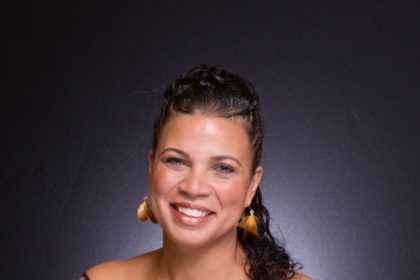Iowans Ready to Caucus Despite Blizzards and Epic Cold

CLEAR LAKE, Iowa — For Andrea Tisor, a native of Iowa who moved away only to move back again, this year’s Republican caucus is something of a homecoming.
From 2014 until 2021, she and her husband lived in the Minneapolis metropolitan area, but during COVID they had an opportunity to move back to northern Iowa and jumped at it.
Having missed the caucuses of 2016 and 2020, this weekend’s vote — despite blizzards and epic cold — is yet another return to normalcy after the upending effects of the global pandemic, she said.
Clear Lake, a small city located on the shore of the natural spring-fed water body that gives the city its name, has a reputation as a tourist mecca located about halfway between Des Moines and Minneapolis.
There are lots of parks and marinas and opportunities for recreation in this 13-square mile community.
And one would be remiss, of course, not to mention that Clear Lake is perhaps best known as the site of the last concert performed by Buddy Holly, Ritchie Valens and the Big Bopper before “the music died” in a 1959 plane crash in a cornfield about five miles north of town.
In this community of 7,700, Tisor is considered an “active” Republican.
“I am ‘active,’” the 51-year-old said, confirming her reputation. “But there are likely many people who could be described that way in this part of the state.
“In fact, my mother is very active in the North Iowa Republican Women’s Club. I am a new member, having just joined in the last two years,” Tisor said.
Speaking of her expectations for Monday night, Tisor likened caucusing across the state to returning to high school.
“Caucusing really is like an election for high school class government, in that in a smaller town, like a smaller school, you know everyone or know someone who knows them,” she said.
“Clear Lake, Iowa, really is a small town. Our last high school graduating class had 110 students; by comparison, my son’s graduating class from Wayzata High School in Minnesota had a graduating class of almost 1,000,” she said.
Tisor explained that she brought this all up because it’s important to recognize the importance of group dynamics on caucus night.
“Larger communities tend to have more clicks or small groups … and to me at least, it seems that in these communities opinions form before you even show up for the caucus,” she said.
“I also think people tend to not be as open-minded when they get in a larger group and are with members of their pack, Tisor continued,
“Regardless — and again this goes back to the notion of a high school election — caucuses are a bit of a popularity contest. So if you don’t have someone at a location to represent you as a candidate, it’s hard to have your voice heard,” she said.
“I expect that at every location, there will be someone that stands up and speaks for Nikki Haley, Ron DeSantis or Donald Trump, and I suspect that all three will be well-represented by their supporters at each location.
“As for Vivek Ramaswamy and Asa Hutchinson, they’re far more likely not to have a physical person in every community speaking on their behalf, and what support they have will probably get lost in the room.”
As long ago as December, Tisor was already predicting a low turnout for this year’s caucuses. A series of blizzards and a frigid cold that has settled over Iowa only hardened that belief.
“There are really two factors at work here,” she said. “One is that our caucuses this year are on MLK Day, in the middle of January.
“That means you’ve lost the ‘snowbirds,’ people who leave the state for warming climes in the winter who would ordinarily be very active voters,” she said.
“Then, of course, there is the weather,” Tisor continued. “So where ordinarily we see a turn out of between 11% and 13%, I think this year we will be lucky to see those kinds of numbers.”
When it comes to her own political activities and the caucuses, Tisor described herself as a “doer.”
“I’m invited to most ‘meet and greets’ in the area and if I’m available, I try to attend,” she said.
“The whole point of this exercise is to listen and learn. It’s the small, town-hall style of gatherings ahead of the caucuses at which candidates are asked real questions about subjects that have meaning to Iowa and its people,” Tisor continued.
“Maybe [the subject of a particular question] isn’t something that affects me and my life, but it’s important to hear what our neighbors are thinking and concerned about,” she added.
Come Monday, Tisor said she would be actively caucusing for former Arkansas Gov. Asa Hutchinson, a task that would likely entail being on calls with the governor’s Iowa team over the course of the day.
“Basically, those conversations revolve around specific message details,” she said. “Once I’m ready, I then head to the caucus site early.”
Tisor thrives on such activity. Prior to moving to Minnesota, she caucused for Newt Gingrich during his unsuccessful bid for the White House.
“When I lived in Minnesota, I tried to get involved up there, but the area we lived in doesn’t have a strong Republican organization, so I was underwhelmed by my experience there,” she said.
By contrast, Tisor said, the night of the caucus in Iowa is one in which “you feel the energy in your ‘bubble’ and in the voices of your neighbors,” she said.
“When you are at a caucus, you are all similar in beliefs and goals and I enjoy the township of it all.
“And then it’s always interesting to go home and watch the numbers come in from around the state and see how other communities voted, and where pockets of supporters for different candidates were,” she said.
“After investing so much time and energy in this, I guess you could say I still feel connected and care when the whole thing is said and done,” she said.
And how will she feel when she finally turns the television off and heads to bed?
“Satisfied,” she said.
“Satisfied that I did my civic duty,” Tisor added.
Monday to Hold Little Excitement for Democrats
Whitney Mixdorf, a 37-year-old mother of three, owns a small bakery in Clear Lake with her husband — the South Shore Donut Company — and also works as a substitute teacher in the local school district.
She’s also a Democrat and activist who was the party’s nominee for the Iowa State Senate from her district in 2022.
Mixdorf said she first got actively involved in the caucuses in 2020 after seeing the outcome of the 2016 presidential election.
“I knew I had to try to create change in our community and really jumped deep into political activism,” she said.
“At the 2019 ‘Wing-Ding’ — North Iowa’s signature Democratic summer event, we got to hear from 21 presidential candidates,” she continued. “I went in that night as a Biden supporter and left as a Pete Buttigieg supporter — in fact, I volunteered for Pete’s campaign, was his precinct captain at our caucus location, and I’m proud to say I helped him win the Iowa Caucus.”
To Mixdorf, the beauty of the caucus system is that it forces conversations between neighbors.
“We have to get in and talk about the kitchen-table issues and how our chosen candidates have earned our support, and we have to persuade others to back our candidate as well,” she said.
Though Mixdorf described the process as “great” for the politically-inclined, she also conceded the whole thing can be a little intimidating for a lot of people.
“To tell you the truth, I think holding a primary would be a better option,” she said.
“I mean, caucusing can last hours, which creates issues for people with young children or those who work later shifts. Plus, it only represents the opinions of those who can get there,” she said.
This year, Mixdorf said, caucus night will be a low-key affair.
“This isn’t an ‘exciting’ year for Democrats, mainly because we are united behind President Biden and no one I know has taken any of his challengers seriously,” she explained. “So we don’t have candidates campaigning in our communities to push turnout.”
“As a result, my husband and I will no doubt be working at the bakery during the day, and then go together to our local caucus site later,” she said.
Adding to the low key mood among Iowa Democrats is the fact the national party effectively “demoted” Iowa by insisting South Carolina hold its first sanctioned presidential election of the 2024 cycle.
“Having the national party move away from Iowa was a real bummer for Democrats in this state,” Mixdorf said.
“We have long enjoyed the excitement, engagement and attention that came along with our caucuses. Our caucus-year winters were filled with candidate events, house parties and canvassing.
“The large slate of candidates in 2020 was especially exciting — you could attend events and meet candidates like Biden, Buttigieg, Kamala Harris, Cory Booker and so on — all in the same week! This will definitely be missed,” she said.
‘Caucus Chaos’ Explained
Political Science professor Karen Kedrowski of Iowa State University laughed as she described herself as a “walking stereotype” when it comes to caucusing.
“I am!” she said. “I’m an academic and I caucus Democratic as does almost everybody I know.”
“Now having said that, I will tell you that one of the things that happens on the Democratic side that does not happen on the Republican side is that Democrats always seem to be fighting the last war,” she said.
“I mean, in general, they’re always trying to fix whatever they think went wrong the last time,” she explained.
“The Republicans, in contrast, spend more time focused on the task at hand,” Kedrowski continued.
“They do what they do, the same thing, year after year, and they do it well,” she said. “I mean, you don’t see them changing the rules. They tend to vote once, write their preferences down and that’s it.”
Kedrowski went on to say one doesn’t have to look too far to find an illustration for exactly what she was saying.
“Sen. Bernie Sanders, I-Vt., 2016,” she said.
“Sanders began winning primaries against Hillary Clinton, but couldn’t gain any ground because the so-called superdelegates virtually guaranteed her nomination. So Bernie Sanders got mad, and the rules changed.
“And this happens all the time,” she continued. “The way Democrats operate — and remember, I caucus for them — means the caucus rules change in some way, every four years. Sometimes it’s a small change; other times it’s a lot.”
Kedrowski said no matter how well intentioned, this willingness — one might say compulsion — to change has real-life consequences when it comes to caucusing.
“What it means is that the volunteers who assist at the caucus sites — many of them having done so for years and years and years — now have to go through another caucus training, and it might not stick,” she said.
“The results aren’t pretty,” Kedrowski said.
In 2020, the professor recalled, she made her way to her caucus site, only to find that the caucus chair, the individual who is expected to implement any changes, had become entangled in uncertainty.
“She kept questioning what she was supposed to be doing and going back and checking the rules. In the meantime, there was a 20-something student who had been interning with the Iowa Democratic Party, and every time she stepped in to assist, everything moved along. Everything was fine,” she said.
“This young student understood the new rules and as a result, the people caucusing at the site when she was running the show knew where they were supposed to go and what they were supposed to say and do … and then the ‘official’ chair came back and everything went off the rails again.”
Kedrowski said she can remember thinking “Why don’t they just put this young woman in charge?”
“She had been at the party’s office, and she knew exactly what was going on and what the rules were … and so I came away with a healthy skepticism of the party apparatus and a healthy respect for the political efficacy of those participating,” she said.
But that’s not to say Kedrowski doesn’t find humor in some aspects of caucus night; after all, in a sense, it’s a process rife with opportunities to highlight human foibles.
“So at Democratic caucus sites, at least before this year, what transpired pretty much fit with people’s idea of what a caucus is … people would get up and make speeches on behalf of their preferred candidates, and then the attendees were supposed to get up and organize themselves in the room based on whom they preferred.
“So in 2020, you’d have Biden people sort of gathering in one area, and the Andrew Yang people assembling in the middle of the room … and of course that’s going to be chaos,” she said.
“And it’s because what would happen is, someone would be headed in one direction and their neighbor would grab them by the sleeve and say, you know, ‘Don’t vote for that loser. Come over here and hang out with me.’”
Kedrowski laughed.
“And it takes a while before anyone finally says, ‘Hey, you’ve got to stop moving around,’ but then people tend not to listen to instructions anyway,” she said.
“And then, you’re supposed to have one opportunity to do it again, but people who found themselves supporting ‘non-viable’ candidates in the first round could count and count faster than the people in charge — so they then started moving even before they were allowed to.
“So when you hear people talk about ‘caucus chaos,’ it’s usually on the Democratic side and especially in larger caucus precincts. And of course, Ames, Iowa, where the university is located has some pretty large caucus gatherings,” Kedrowski said.
“Mine must have had about 300 people participating in all, and in Des Moines, there are some precincts where you might have as many as 1,000 people. In a smaller community, like Clarinda, Iowa, out west, you’re probably talking about fewer than two dozen people participating.”
Despite what must have been at times a frustrating experience, Kedrowski said caucus night 2020 ended in a “fairly neighborly” fashion.
“During the actual caucus, my next door neighbors were standing over in the Biden corner and I wasn’t,” she said. “Later, we ran into each as we were leaving and they said, ‘Well, you know, we just think he’s the only one who can win.’
“After that it was, ‘So how’s your mother?’ and the kind of neighborly chit chat that you do all the time,” Kedrowski said.
Surprise Candidate Visit and no Talk of Politics During the Holidays
Chris Burk, general manager of The Corner Pizza and Alehouse on East State Street in Mason City, Iowa, wasn’t born in the state — he hails from Omaha, Nebraska — but his family moved to Council Bluffs, Iowa, when he was 12.
“All I’ve ever known of the political system is how Iowa does it,” Burk said recently.
“I have attended quite a few caucuses … in Council Bluffs, Iowa City and of course here in Mason City. The only ones I’ve missed were due to deployment overseas,” he said.
With that, Burk hesitated and smiled.
“In fact there was one, in Iowa City, I accidentally went to the wrong site and wound up caucusing for the opposite party,” he laughed.
Burk said on Monday he and his wife will make their way to the Lincoln Intermediate School in Mason City, the site closest to their home.
“They’ve got a decent setup for organizing the groups of participants and allowing people to move about freely. There are no real rituals,” he explained.
When it comes to unpacking whom to support, Burk said most of the soul-searching that goes on in his family is a personal matter.
“We all have our opinions, and when it comes to politics, I guess you could say we’ve been divided for quite a while. As a result, we have a strict family rule that no politics are discussed on Christmas Eve or Christmas Day,” he said.
“My mother was a career teacher and followed the candidates that most promoted education,” he continued. “I have been in the Army for over 23 years now, so the candidates that best support a well-rounded defense policy are some of the ones I lean towards.
“While we all have our set beliefs on certain issues, there is no real party line division that we draw,” Burk added. “We all understand that all sides need to be looked at for the greater good of our country.”
Asked whether, given his priorities, he’d personally settled on a candidate, Burk admitted he hadn’t.
“There are bits and pieces of some candidates that I like,” he said.
One he does like, at least based on personal experience, is Florida Gov. Ron DeSantis, who held a campaign event at The Corner Pizza and Alehouse.
“We actually didn’t realize we were about to host a Ron DeSantis visit until the day before it actually happened,” Burk said. “The woman lining up the event said only that she wanted to set up a lunch for about 150 people.
“And of course, we jumped at it because the event was planned at a time that’s usually a slower period for us,” he continued, adding, “We didn’t ask too many questions.”
At the time, The Corner Pizza and Alehouse had been open for all of 14 months, and so it was the first time the owners had a chance to participate in the caucuses in this way.
“Fortunately, my parents have a banquet hall in Council Bluffs and have hosted many candidates before, so when we actually did learn who was visiting, I was able to reach out to my parents for advice,” Burk said.
When the actual date of the Tuesday afternoon event arrived, the biggest challenge for the restaurant and its owners was managing the associated network infrastructure needs of a neighborhood business and a full-blown presidential campaign.
“We have Wi-Fi available to all patrons, but also use it for our point of sale needs as well,” Burk said.
“The biggest challenge for us was the need for the Never Back Down group [NeverBackDown.org, a PAC supporting DeSantis] to use our network to broadcast the event,” he said.
On the day of the lunch, the campaign’s predicted turnout proved close to spot on.
Ultimately, about 130 people did show up to hear what DeSantis had to say, much to Burk’s satisfaction.
“Oh, it was a good turnout,” he said.
“It was actually the best Tuesday lunch we have ever had, and the campaign group was awesome to work with; they took really good care of our staff.”
“As I said, the opportunity to do this came at a slow time for the business. Compared to this time last year, we were probably down about 5% in terms of sales overall. However, for that week. We were up 80%,” he said.
“And on a personal level, I enjoyed seeing Ron’s wife and kids with him. They were very personable and hung out in the back while he was on stage,” he said.
Turning to the matter at hand, the looming caucuses, Burk said turnout is notoriously hard to predict.
On the one hand, Iowans are well aware of what winter in Iowa is like and simply deal with it.
“So I’d suspect, with the caucuses still the first event of the Republican presidential race, people are still a bit more motivated to turn out, rather than pass up the chance to have their say,” he said.
“At the same time, while Iowa may caucus strong, I also believe that there is a bit of burn-out by the time the election comes around,” he added.
And come Tuesday morning, when the candidates and campaigns and media pack up and head to New Hampshire?
“Well, I think the small period of calm after the storm … is probably appreciated by most Iowans,” Burk said. “It never really stops, but it is always fun to be the first ones in the country to make an impression.”
Dan can be reached at [email protected] and at https://twitter.com/DanMcCue
























